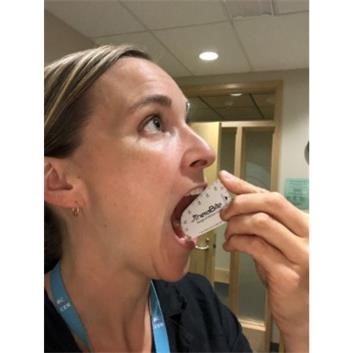
The BC Cancer Practice-Based Research Challenge is an innovative approach that bridges the gap between clinical practice and research by empowering teams of point-of-care clinical staff to identify challenging clinical issues and find evidence-based answers through research. This annual program offers nursing and allied health professionals with limited, or no research experience the opportunity to learn basic research skills while conducting their own project.
Hilary Cochrane and Lisa Kuhn, both speech pathologists, along with Cara Miller, a dietitian at BC Cancer Victoria, joined the Research Challenge in 2021 with the aim to better understand patient experiences with late radiation associated dysphagia effects.
Hilary and her team will be completing their research project this year, and as the team lead, she generously shared her insights and experiences with the Research Challenge.
Q: Thank you for joining us today! Could you start by sharing an overview of your research project?
Hilary: My project is focused on a relatively rare late impact of head and neck radiation treatment. It is called late radiation associated dysphagia (Late RAD for short) and this population experiences a progressive decline in their ability to swallow (and sometimes speak) many years after being cancer free. I have been seeing more of these patients in my clinical practice and felt that there is a gap in awareness of this group and their lived experience in both healthcare provider knowledge as well as research. This was a qualitative study using semi-structured interviews to encourage participants to share as much of their experience as they were comfortable with. We then looked at themes that arose from the data and are hopeful that this knowledge can help guide healthcare providers about what to consider when caring for people with this challenging condition.
Q: Could you tell us a bit more about your team?
Hilary: For a small study, this required quite a team! I was very fortunate to be paired with highly experienced mentors in the field of swallowing research who became co-authors as well. Stacey Skoretz is a professor at UBC and the director of the Swallowing Innovations Lab (Si-Lab), and Camilla Dawson is a clinical researcher in Birmingham, UK, with extensive experience with qualitative studies in the field of speech-language pathology. I also paired with a patient partner, Andre Kushniruk with lived experience of head and neck cancer who was involved from study conception to analysis. My colleagues, Lisa Kuhn and Cara Miller also supported throughout with guidance and assistance with interviews, and we were able to use Si-Lab research students to assist with transcription.
Q: What an incredible team to work with! Reflecting on your time in the Research Challenge, could you share some highlights that stood out to you?
Hilary: One of the big highlights for me was being able to work alongside such experienced researchers and have their support and encouragement about the value of study. I was motivated by the patients I was seeing to increase awareness about their lived experience, but I didn’t expect to get ‘hooked’ on research. Completing this study gave me a wider view of what research can look like and how it can be incorporated into my clinical work. As a clinician who is usually working in direct patient care, it was nice to feel that I was adding something bigger picture that might help others with Late RAD down the road.

Pictured: Hilary Cochrane. Demonstrating how to measure the mouth opening for a patient.
Q: Definitely, research is very important in informing practice-change within clinical work. Research projects often come with their fair share of challenges. Could you speak about some of the obstacles you faced and how you worked through them?
Hilary: I think that the biggest challenge for me was staying on track with the timeline. It was a balance between my busy clinical work and prioritizing time for the study. I was fortunate to have supportive management, but I did need to work in my own time as well, which was challenging as a parent with young children. I also reached out to bursaries and scholarships and was able to obtain time to work on my write-up while my patients were covered by another clinician. Brainstorming creative ways to find time and speaking with management was really helpful. I would also mention that this was not as much of a challenge for myself, but my mentors were very kindly volunteering their time for this project within their own demanding roles. I tried to respect that by ensuring that I was well prepared for any of our meetings to respect their time.
Q: That is great to hear! Now that you are almost finished with your research project, how are you planning to share your findings?
Hilary: Now that the project is wrapping up, I have started to apply to different conferences to present my findings. I recently presented at a speech-language pathology conference at UBC and am looking forward to a couple presentations at the 2023 BC Cancer Summit. After my write-up is fully edited, we are hopeful that publishing in relevant journal will be an option as well. I am also hoping to look at other options for knowledge transfer recognizing that most of the people experiencing late RAD are no longer followed by the oncology team and are in their home communities with their primary care provider. My goal would be to take what participants mentioned in the study and use it to create recommendations that would improve their experience navigating late RAD and feeling empowered to make informed decisions that align with their unique values and priorities.
Q: It is exciting to see you showcasing your work! What advice or recommendations do you have for point-of-care clinicians who are wanting to learn more about research or are thinking about joining the Research Challenge?
Hilary: From my experience, I would suggest choosing a topic that you are passionate about. The Research Challenge is a wonderful opportunity and is also a significant undertaking. For me, feeling connected to the topic and the participants really helped me keep going even when it felt overwhelming. Now that I’m towards the end of the study, I’m excited about what my next research opportunity might look like.
Do you have a clinical research question? Join the 2024 Practice-Based Research Challenge!
Details on how to participate are now available on our website.
- Review the 2024 Research Challenge timeline and FAQ.
- Complete and submit a letter of intent by 4:00 pm on February 12th, 2024.
- Email Perla Araiza (research project coordinator) at research.kt@bccancer.bc.ca
The Research Challenge is organized by the Nursing and Allied Health Research & Knowledge Translation Department in collaboration with academic partners and the BC SUPPORT Unit.
For more information
We will be hosting an overview session on January 25, 2024 | 12 p.m. - 1 p.m.
- Join by Zoom: https://phsa.zoom.us/j/65203021223?pwd=V0pEUFFRakJ4dDFobm9yUDNJSkNTZz09
- Meeting ID: 652 0302 1223
- Password: 369019